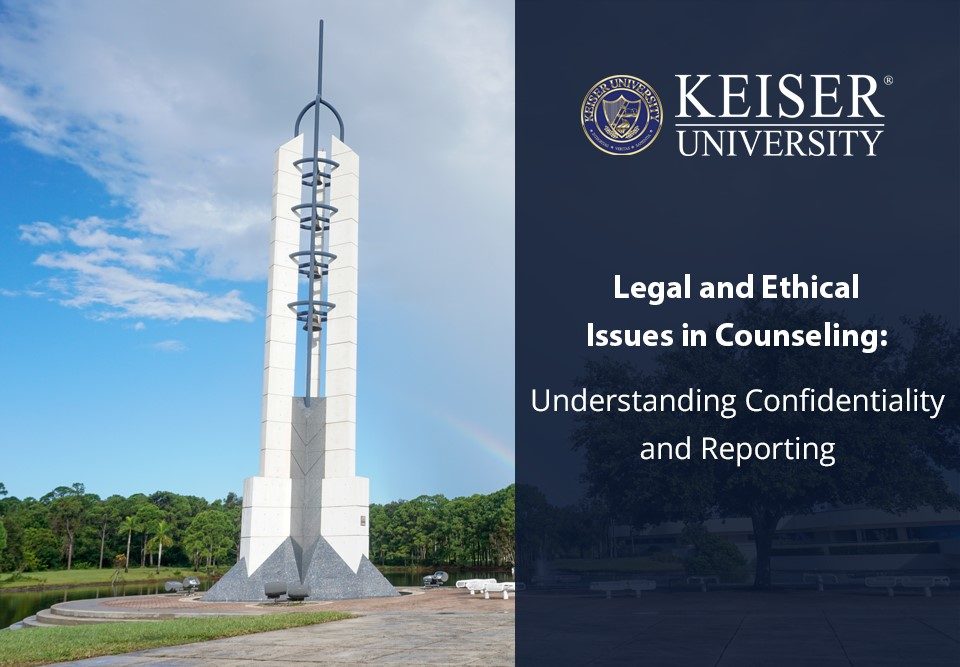Counseling is a profession that frequently requires tough decision-making. Fortunately, numerous legal and ethical standards are in place to help guide counselors through those decisions. Mental health counselors must strive for upright, principled practice oversight with specific focuses on confidentiality and reporting.
Delve into an examination of these core principles as well as the overall legal and ethical implications of a career in counseling.
Role of Legal and Ethical Guidelines in Counseling
A 2022 article from the Indian Journal of Psychiatry establishes a broad purview for sensible counseling guidelines that cover a broad range of ethical and legal issues in psychotherapy; these include the “competence of therapist, responsibilities of therapists towards their clients, therapeutic contract, informed consent, confidentiality, privilege and psychotherapy supervision, documentation, self-disclosure, matters of business (advertising, fees, etc.), research, counter-transference, boundaries, professional negligence, termination, and post-termination issues.”
Ethical and Legal Considerations in Counseling
The authors of the aforementioned report single out positive ethics, defensive practice and risk management as the three most important ethical and legal issues in counseling today. Positive ethics revolve around the virtuous aspirations of individual therapists who want to maximize patient benefits. Defensive practice takes a proactive approach to decision-making with a focus on reducing possible adverse outcomes. Risk management places a specific emphasis on the legal aspects of counseling by preventing or mitigating risks in the form of malpractice claims or complaints to authoritative bodies of legal and ethical oversight.
Defining Ethics in Counseling
In the words of the national health and well-being employee assistance program Health Assured, the ethics of mental health counselors “specifies the values, principles and personal moral qualities that inform our work and underpin supervision.” Furthermore, a firm commitment to patients “provides a summary of working to professional standards and building an ethical relationship.” A highly ethical approach to counseling is particularly essential because the average mental health counselor is privy to highly confidential and personal information regarding patients’ deepest hopes and darkest fears.
Confidentiality in Counseling (HIPAA)
In 1996, President Bill Clinton signed the Health Insurance Portability and Accountability Act (HIPAA) into law to promote more efficient healthcare delivery and provide more United States citizens with quality healthcare coverage. The addition of the HIPAA Privacy Rule in 2000 extended a series of specific confidentiality protections to people receiving medical treatment.
By preventing the unsanctioned disclosure and inappropriate use of protected health information (PHI), HIPPA has been proven to further and enhance mental health progress. After all, HIPPA confidentiality encourages patients to share their thoughts and feelings freely. If a patient is worried that a therapist might share sensitive PHI, those privacy concerns may become a serious obstacle to healing and improvement.
Understanding Confidentiality
The HIPAA Privacy Rule provides national standards that protect the medical records and personal health information of all medical patients in the U.S. This includes information about mental health. It is worth noting that HIPAA regulations aren’t necessarily the last word in medical confidentiality, as many states have stricter laws to protect PHI.
Importance of Maintaining Confidentiality in Counseling
The (APA) emphasizes that confidentiality is a respected pillar of the field’s code of ethics. Speaking directly to counseling patients, the APA contends, “Psychologists understand that for  people to feel comfortable talking about private and revealing information, they need a safe place to talk about anything they’d like, without fear of that information leaving the room.”
Legal Framework for Confidentiality
Beyond its broad ethical significance, confidentiality stands out as a key legal concern in counseling. Bonnie R. Benitez, JD, from the California Association of Marriage and Family Therapists, identifies confidentiality as crucial part of what “distinguishes the therapist-patient relationship from many other professional relationships,” highlighting it as both a legal and ethical matter. However, Benitez cautions that it comes with numerous exceptions, both mandatory and permissive, which therapists must be prepared to manage.
Limits of Confidentiality in Counseling
While counselors must respect patient confidentiality as a general rule, certain situations permit (if not require) them to share information, even if it is private or sensitive in nature.
When Confidentiality Can Be Broken
As stated by the APA, therapists may disclose patient information without consent to prevent patients from harming themselves or others. They are legally required to report ongoing domestic violence, abuse and neglect of children, elderly individuals and people with disabilities. In many cases, therapists are compelled to release information according to an official court order.
Client Consent and Exceptions
Although patient confidentially laws may differ from state to state, in most situations, information can be shared if the patient provides written consent to do so. Beyond the client consent and the exceptions outlined by the APA, confidential information can be shared with a payor, aka insurance, for relevant billing purposes and to share critical health information among multiple providers.
Reporting Obligations in Counseling
As previously mentioned, there are numerous situations and conditions that legally require a counselor to make an official report. In most instances, patients or their legal guardians sign a consent form before securing services with a counselor. This consent form should clearly detail the specific circumstances that require the counselor to break confidentiality.
Mandated Reporting
In all 50 states, counselors must contact authorities when patients present a direct, impending danger to themselves or others. Similarly, all counselors practicing in the U.S. must alert authorities to cases of recent or ongoing child abuse. However, the legal definition of impending danger and existing abuse might differ by state, as well as the relative stringency and specific stipulations of their mandates. For example, therapists in different states and under different circumstances may or may not be required to tell a patient or their family members when a report is being filed.
Definition and Legal Requirements
The principle of mandated reporting obligates under the law that certain types of professionals—namely those who regularly interact with vulnerable populations or sensitive topics—must report suspected or observed abuse. Because legal requirements for mental health counselors vary substantially from state to state, so may their reporting duties.
Prospective and practicing counselors are obligated to fully understand and appreciate all applicable state laws as they structure practice procedures and make informed decisions about patient interactions. If counselors have questions about the specific circumstances that warrant mandated reports, they should research relevant state statutes and government regulations or contact their licensing organizations.
Types of Abuse and Situations Requiring Reporting
Like other criteria for obligatory reporting, the particular patient situations and instances of abuse that demand a report can vary substantially from state to state. Although practicing counselors would be wise to check state laws for specific reporting requirements, in most cases, certain types of information must be presented in order to file a report with authorities.
Both a victim and a perpetrator should be clearly identified in any given scenario of domestic or child abuse. For instance, someone simply stating they are concerned with their child’s sexual behaviors would not mandate a report; however, a person disclosing that an adult family member has inappropriately engaged with their child sexually would provide sufficient support and detail for a counselor to report it.
Ethical Considerations in Reporting
In addition to reporting critical situations involving their patients, counselors are obligated to report any personal conflict of interest that may put them in legal jeopardy or prevent them from placing their patients’ best interests over their own. In order to identify and manage these potential conflicts of interest, counselors must remain objectively critical of their own ethical conduct.
Conflicts of interest, such as serving the best interests of third-party fee payers over those of patients or entering multiple relationships with patients and those close to them, are inadvisable and typically require reporting. Examples of close relationships range from counseling multiple close friends or family members concurrently to dining with a patient struggling with anorexia. Of course, it is also problematic to engage with a patient romantically.
Balancing Client Trust and Legal Obligations
While an official confidentiality agreement can do wonders when it comes to establishing counselor/patient trust and facilitating open communication, subsequently breaking that agreement can have a detrimental effect. Counselors who are legally obligated to break that confidentiality by filing a government report or reporting a pressing matter to relevant authorities must handle the situation delicately to honor the trust inherent in the counselor/patient relationship.
Best Practices for Counselors
To ensure they always stand on solid legal and ethical ground, counselors must remain constantly compliant and vigilant. Fortunately, several best practices can aid in their confidentiality and reporting efforts.
Effective Communication With Clients
Communication skills are fundamental to a counselor’s success for several reasons. Beyond listening to patients actively and critically, counselors must carefully compose all outgoing communication, tailoring it to meet the unique preferences, capabilities and goals of each patient with whom they work. Part of this outgoing communication is clearly stating all confidentiality and reporting requirements. Additionally, counselors must ensure that all communication with patients and third parties is conducted with legal and ethical implications in mind.
Secure Handling of Client Information
Leaking sensitive personal health information can prove dangerous to patients and costly to counselors. Therefore, counselors must handle that information with extreme care. To ensure full protection, the HIPAA Privacy Rule explicitly requires counselors to implement “reasonable administrative, technical and physical safeguards to ensure its confidentiality, integrity and availability and to prevent unauthorized or inappropriate access, use or disclosure.”
Identifying Reportable Situations
Determining whether an incident or situation is reportable can be a tricky endeavor, as it also requires balancing patient trust with ethical and legal obligations. However, a diligent counselor can make reporting issues far easier to navigate by thoroughly understanding and adhering to medical sector best practices as well as state and local regulations.
Documentation and Follow-Up Procedures
Beyond securing the proper documents to report an incident or situation, counselors should keep accurate and up-to-date records of their own. The American Counseling Association (ACA) suggests documenting all decision-making processes in each patient’s file, elaborating: “A counselor is probably acting in an ethically responsible way concerning a client if he or she has maintained personal and professional honesty, coupled with the best interests of the client, without malice or personal gain, and can justify his or her actions as the best judgment of what should be done based upon the current state of the profession.” The ACA also recommends checking in afterward to ensure that the incident or situation is being responsibly handled.
Training and Continuing Education
The first step toward ensuring legal and ethical compliance as a mental health counselor is securing a specialized degree like a Master of Science in Clinical Mental Health Counseling. But preparing for a successful career is just the beginning of a counselor’s educational journey. While in professional practice, ongoing updates and training are essential to both provide quality care and stay abreast of applicable legal and ethical concerns.
Importance of Ongoing Education
Most mental health counselors must earn continuing education units (CEUs) to keep licenses to practice. Organizations like the ACA offer ample opportunities to learn about legal and ethical issues in counseling while garnering CEUs. Recent ACA CEU courses include “Don’t Become a Case Study! Liability Risks and Recommendations for Counseling Practice” and “Counseling Collage: Crafting Cultural Competence in Supervision.”
Laws and Ethics as Part of a Comprehensive Mental Health Counseling Education
At Keiser University, we offer a Master of Science in Clinical Mental Health Counseling program in which students closely examine counseling laws and ethics. Hands-on clinical experiences help round out the curriculum, allowing students to integrate counseling skills and knowledge from their coursework into real-world settings. To learn more about this degree program, contact a knowledgeable graduate school admissions counselor.





